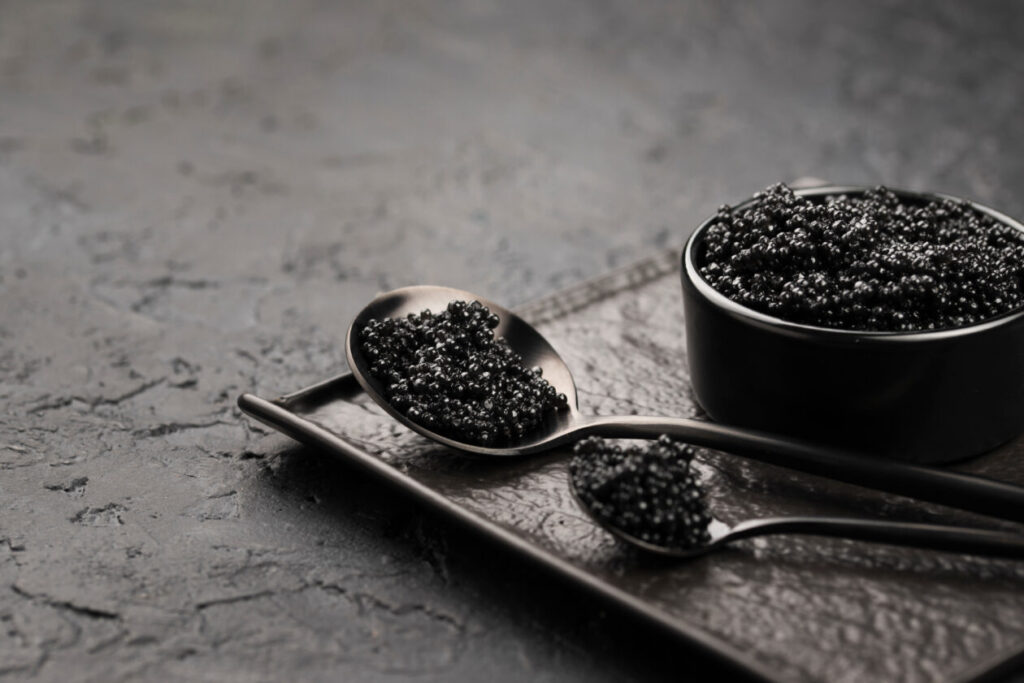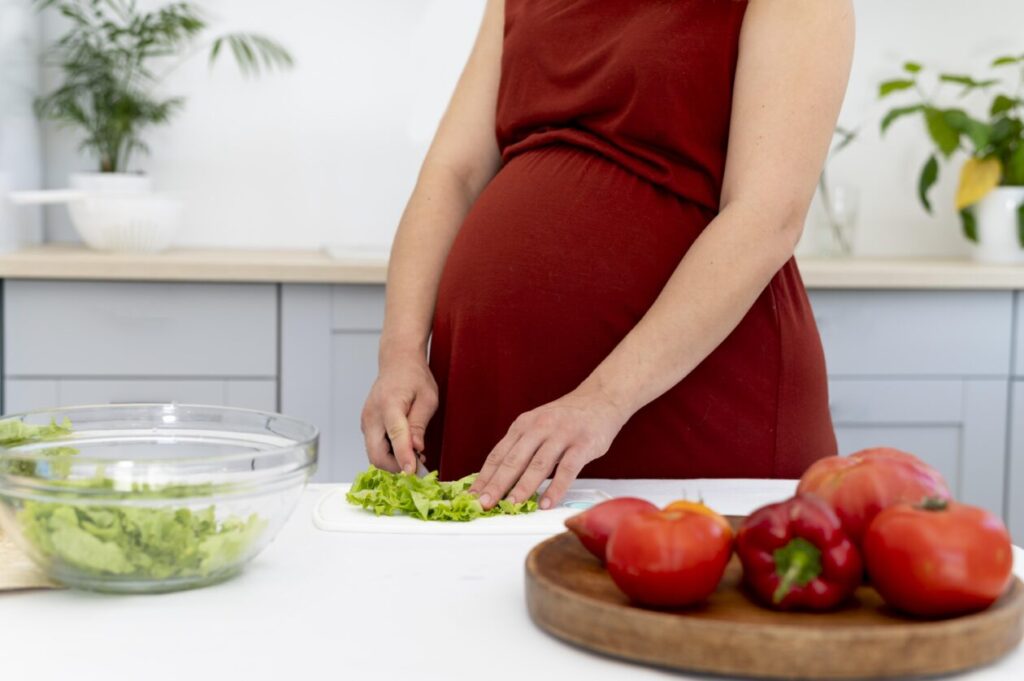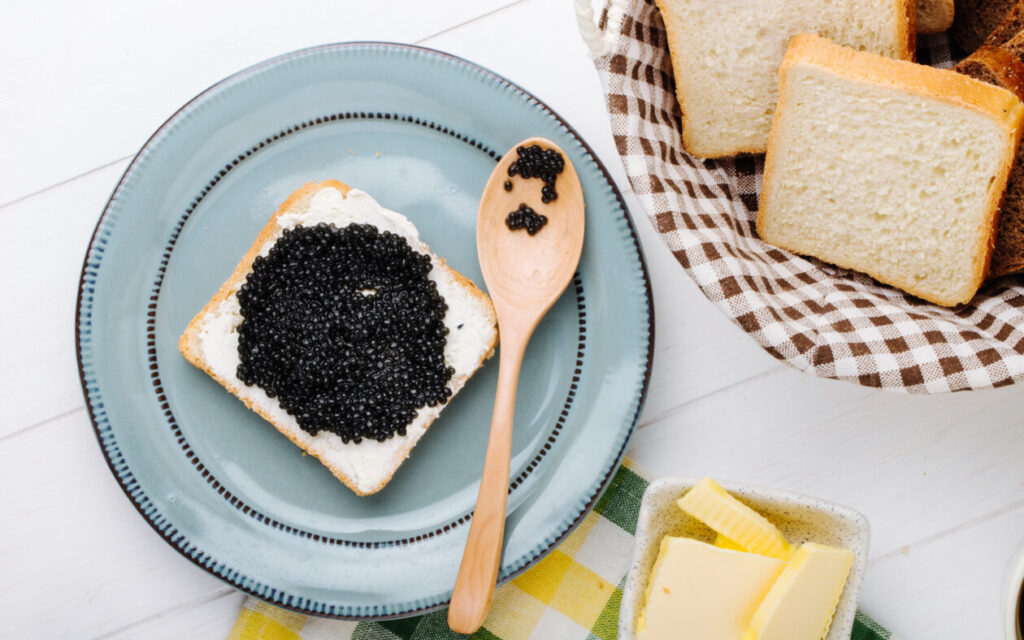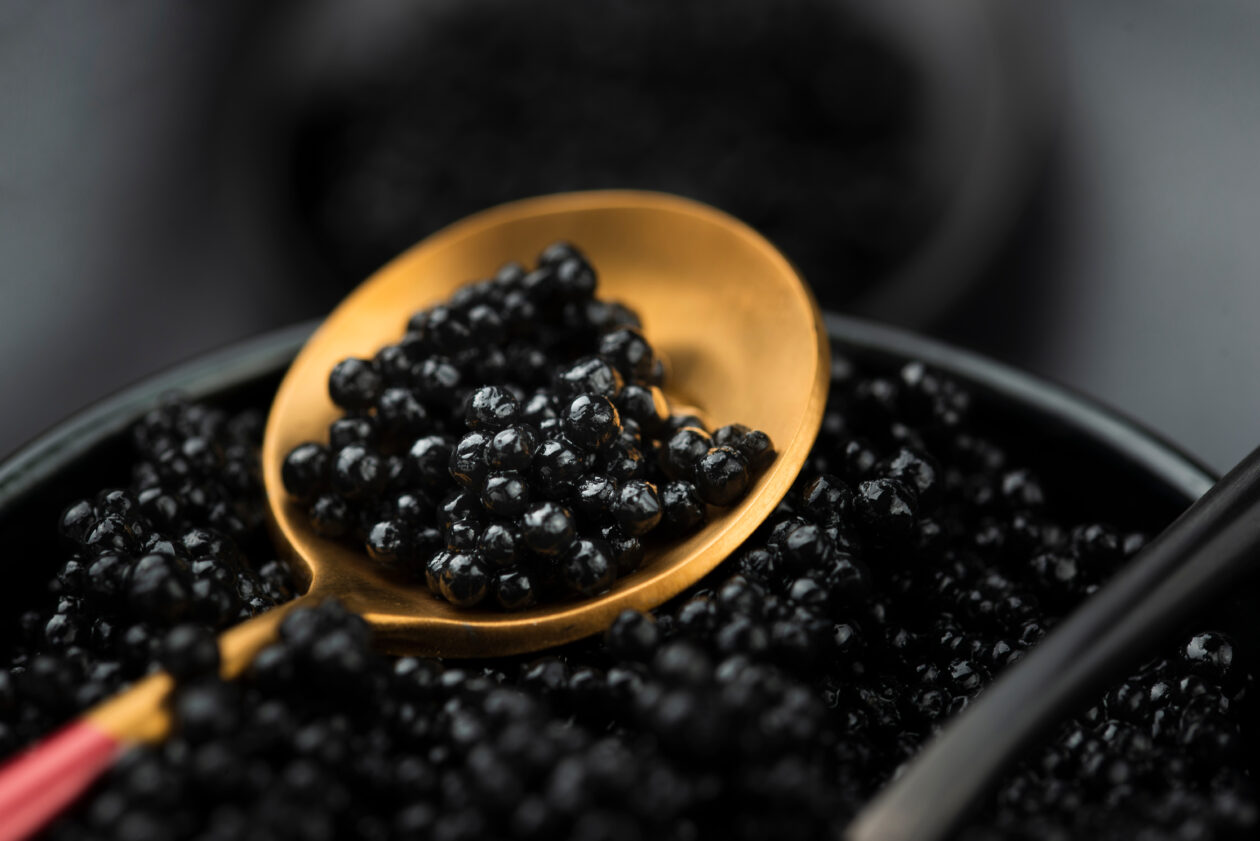Introduction
In the world of pregnancy and nutrition, expectant mothers often navigate a sea of information, especially when indulging in certain delicacies like caviar. It’s a subject that has recently seen increased attention, with passionate discussions filling the air. The question at the heart of it is whether pregnant women can safely enjoy caviar. This comprehensive guide will dive deep into this dilemma, shedding light on the risks, benefits, and the latest recommendations for those who taste the finer things during pregnancy.
Caviar, those tiny pearls of luxury extracted from sturgeon fish, has garnered a newfound allure among pregnant women. Social media influencers and pregnancy “experts” have propelled this delicacy into the limelight. They tout its nutrient-packed properties and potential benefits for fetal neurodevelopment. But with the rise in popularity comes a flurry of questions and concerns. Is caviar a superfood for expectant mothers or an unnecessary risk? How does it work its magic, and is it worth the hefty price tag? Moreover, what about the looming specter of mercury in fish?
This Article aims to demystify the caviar problem for pregnant women, providing them with a comprehensive and well-informed guide. We’ll explore the world of caviar, from its origins to its various types and nutritional content. Most importantly, we’ll address the critical question – can pregnant women safely consume caviar? We’ll delve into the importance of pasteurization and refrigeration when considering caviar as part of a pregnancy diet. Additionally, we’ll discuss the benefits and potential risks associated with caviar consumption during pregnancy. So, if you’re an expectant mother craving caviar or simply curious about this luxurious delicacy, read on to find out if it’s a safe choice for you and your baby.
Can Pregnant Women Eat Caviar?
Pregnant women can safely enjoy caviar if it is pasteurized. Pasteurization eliminates harmful bacteria like listeria, reducing the risk of infection. However, it’s crucial to avoid raw or unpasteurized caviar to prevent potential health complications for both mother and baby. Always opt for pasteurized caviar and consult healthcare providers for personalized guidance.
Understanding Caviar

Caviar, the star of many gourmet dishes, is a culinary jewel derived from the unfertilized eggs of sturgeon fish. These fish can be found in various locations, from the Black and Caspian Seas to subtropical and subarctic waters in North America and Eurasia. While you might imagine sturgeon as colossal creatures due to their cinematic portrayals, these majestic fish typically weigh around 60 pounds, although they can grow to even more colossal sizes.
For instance, some belugas in the Caspian Sea have been reported to reach a staggering 18 feet and 4,400 pounds. These fish have remarkable lifespans, some surpassing a century, although the average is around 50-60 years. They attain sexual maturity at approximately 15-20 years old.
Caviar comes in many varieties, each offering nuanced differences in flavor and appearance. It’s challenging to put the taste of caviar into words, especially if you haven’t had the pleasure of experiencing it. Generally speaking, it’s known for its salty, buttery, and mildly briny flavor that bursts on the palate.
You might have encountered it as a sushi topping, where it provides an intensely savory pop of flavor. When it comes to the most expensive caviar, it’s typically derived from the beluga and ossetra varieties of sturgeon fish, with Kaluga and sevruga also highly prized. It’s a gastronomic delight that has earned its place in fine dining.
Varieties and Gastronomic Significance
Caviar is a world filled with nuances, a sensory journey for the discerning palate. While the primary source remains sturgeon, there’s a diverse array of caviar varieties. These encompass variations in the color and size of the eggs and, most importantly, the subtle differences in flavor. One of the most intriguing aspects of caviar is the variety of types available.
From the luscious salmon roe or salmon eggs, known as Ikura in the world of Japanese cuisine, to the classic black caviar, a category featuring the iconic Beluga, sturgeon, and osetra varieties, each has its unique charm, for those who favor a touch of the exotic, smelt roe (known as Masago) and flying fish roe (Tobiko) offer alternative experiences.
Caviar isn’t just another ingredient; it’s a culinary masterpiece with a significant place in gastronomy. The jewel crowns delicate dining dishes, gracing plates with elegance and flavor. Its luxurious texture and complex taste profile make it a sought-after delicacy in traditional and contemporary cuisine. The way it complements other ingredients, enhancing flavors and elevating the dining experience, is a testament to its enduring significance in the world of culinary arts.
Yet, while caviar is adored for its sumptuousness, it also sparks intriguing questions, especially for pregnant women. Is indulging in this delicacy during pregnancy safe, or should one exercise caution? In the following sections, we’ll explore caviar consumption’s safety and nutritional aspects during pregnancy.
Differentiating Caviar and Roe
Caviar and roe are terms that often surface when discussing fish eggs, but what sets them apart, and why does it matter? Simply put, caviar is the luxurious offspring of sturgeon fish, exclusively derived from their unfertilized eggs. The United States permits any salt-cured fish eggs to be labeled as caviar, but in the truest sense, caviar is harvested only from sturgeon. On the other hand, roe refers to fish eggs harvested from species other than sturgeon, such as salmon, smelt, whiting, paddlefish, flying fish, trout, lumpfish, capelin, cod, and herring.
Even marine creatures like shrimp, scallops, and sea urchins possess edible roe. It’s important to note that while all female fish carry eggs, not all are suitable for human consumption.
One of the distinguishing factors between caviar and roe is the price tag. A 17 oz. (482g) For instance, a wild king salmon roe container typically costs around $74. Given that a serving is approximately 2-3 tablespoons, that’s quite a generous portion of roe. It satisfies the palate and packs a significant nutritional punch, although precise nutritional values can sometimes be challenging to quantify due to limited data availability.
When it comes to pregnant women, the question arises: can they safely indulge in caviar or roe? The FDA advises expectant mothers to steer clear of raw fish, but it’s considered safe to eat when caviar or roe is pasteurized and refrigerated. These delectable delicacies are rich sources of bioavailable omega-3s known to benefit fetal neurodevelopment.
However, when fish eggs aren’t pasteurized, it’s best to exercise caution as they may harbor pathogens. One of them is listeria, a foodborne bacterial illness that can prove fatal to a fetus and newborn. Pregnant women are more vulnerable to listeria due to changes in their immune systems during pregnancy, and unborn babies have limited resistance to foodborne diseases.
While the symptoms of listeria include flu-like muscle aches, fever, nausea, vomiting, and diarrhea, it’s essential to recognize that the signs can take up to 30 days or more to manifest. In severe cases, listeria can spread to the nervous system, causing symptoms like a stiff neck, headache, confusion, loss of balance, or convulsions. Even without noticeable symptoms, it’s possible to transmit listeria to a fetus or newborn. Therefore, pregnant women should avoid unpasteurized caviar or roe, even though they’re typically handled to minimize food safety risks.
Safety Guidelines for Pregnant Women

When it comes to pregnancy, every bite you take has an impact not only on your health but on your growing baby’s well-being. With its abundant nutritional benefits, seafood often finds its way into the diets of expectant mothers. Yet, navigating this culinary landscape cautiously is essential, especially regarding caviar and fish roe.
The FDA (Food and Drug Administration) is crucial in providing guidelines for pregnant women’s seafood consumption. Their recommendations emphasize the importance of including fish and shellfish in one’s diet, as they are rich sources of omega-3 fatty acids, high-quality protein, and essential nutrients like iodine, iron, and choline. These nutrients are not only beneficial for maternal health but also support fetal development.
However, the FDA also sounds a note of caution. Pregnant women are advised to avoid certain seafood items that are high in mercury, as excessive mercury consumption can harm the developing nervous system of the fetus. Fish like shark, swordfish, king mackerel, and tilefish fall into this category and should be removed from the menu during pregnancy.
They are now turning our attention to the topic at hand—caviar and fish roe. These delectable fish eggs are often associated with luxury and gourmet dining. However, not all caviar and roe are created equal, especially when it comes to safety for pregnant women.
The primary concern arises from caviar and fish roe, often served raw, which aligns with the traditional preparation method. Yet, this rawness can pose certain risks. Research conducted in Japan and Scandinavia has shown that raw fish eggs, if contaminated, can harbor pathogens like listeria. A Japanese study found that out of 208 samples of raw minced tuna and fish eggs, ten tested positive for listeria, approximately 3.37% of the samples.
For pregnant women, exposure to listeria can be particularly concerning. The immune system changes during pregnancy, making expectant mothers more susceptible to certain infections. Unborn babies also have limited defenses against foodborne diseases, so it’s crucial to err on the side of caution.
Health Benefits of Consuming Caviar During Pregnancy
While the safety concerns surrounding caviar and fish roe during pregnancy are vital, it’s equally crucial to acknowledge the potential nutritional advantages they offer expectant mothers. Caviar, often associated with luxury dining, is more than just a delicacy; it’s a powerhouse of essential nutrients.
- First and foremost, caviar is renowned for its exceptionally high content of omega-3 fatty acids. These healthy fats are celebrated for promoting heart health and brain function. During pregnancy, omega-3s become even more critical and integral to fetal neurodevelopment. The omega-3s in caviar can support your baby’s cognitive and visual development, making it a favorable addition to your diet.
- Beyond omega-3s, caviar is packed with other essential nutrients that benefit maternal health and the developing fetus. It’s a rich source of high-quality protein, necessary for the growth and repair of tissues, including those of the newborn baby. Additionally, caviar contains significant vitamins, including Vitamin C, riboflavin (Vitamin B2), B12, and folate.
- Vitamin C is essential for maintaining healthy skin, bones, and connective tissues. Riboflavin plays a crucial role in energy production and overall growth. Vitamin B12 is vital for the formation of red blood cells and neurological function. Folate is especially critical during early pregnancy, as it helps prevent congenital disabilities of the baby’s brain and spine.
Incorporating caviar into your diet provides a nutritional boost that supports your and your baby’s well-being. However, it’s crucial to remember that these benefits are associated with pasteurized and refrigerated caviar, as they eliminate the risks posed by bacterial contamination.
As we delve deeper into caviar, we’ll explore the various types and flavors available, helping you make informed choices to ensure your and your baby’s safety and health.
Risks and Contaminants in Fish Eggs
Now, as we explore the world of caviar and fish roe during pregnancy, it’s crucial to delve into the potential risks and contaminants that may lurk in these delicacies. While caviar and fish eggs offer numerous benefits, there are concerns worth noting, primarily related to environmental pollutants.
One of the critical concerns is methylmercury, a toxic substance found in many types of seafood. Methylmercury can pose risks to the developing fetus, potentially affecting the nervous system. However, not all fish eggs contain significant levels of methylmercury. Sturgeon caviar, for instance, is often considered safer in this regard.
Another class of contaminants to be aware of includes organochlorine pesticides (OCPs) and polychlorinated biphenyls (PCBs). These environmental pollutants can accumulate in fish and, subsequently, fish eggs. The risks they pose are well-documented, and selecting fish eggs from sources known for rigorous testing and quality control is essential.
Numerous studies have examined the levels of contaminants in fish eggs, especially caviar, to understand the extent of the risks they might pose. Research has shown that the levels of these pollutants can vary significantly among different types and sources of fish eggs. This highlights the importance of making informed choices when considering caviar or fish roe during pregnancy.
To mitigate these concerns, it’s advisable to choose reliable sources and opt for pasteurized and refrigerated fish eggs. These measures help ensure the safety of caviar during pregnancy while minimizing the potential risks associated with contaminants.
As we continue our journey through caviar and fish eggs, we’ll guide you on selecting safe and reputable sources, empowering you to make the best choices for you and your baby’s well-being.
The Role of Pasteurization and Refrigeration
Now, let’s uncover the pivotal role of pasteurization and proper refrigeration in ensuring the safety of caviar and fish eggs during pregnancy. Understanding these processes is essential for making informed choices.
Pasteurization is a technique that involves heating a product to a specific temperature to kill harmful bacteria and pathogens. In the case of caviar and fish roe, pasteurization is a crucial step in making these delicacies safe for consumption during pregnancy. When fish eggs are pasteurized, it significantly reduces the risk of bacterial contamination, including harmful bacteria like listeria.
However, pasteurization alone isn’t the only safeguard. Proper refrigeration also plays a vital role. Even if caviar or fish eggs have undergone pasteurization, they must be stored at cold temperatures, typically at or below three °C (37.4°F). This chilly environment prevents the growth of bacteria, maintaining the safety and quality of these seafood delights. A 2007 study found that the storage temperature of fish roe significantly impacted bacterial growth, highlighting the importance of keeping them cold.
But there’s a common misconception here. Some believe caviar can be stored at room temperature, especially when it’s pasteurized. This is where understanding the nuances of food safety is crucial. Pasteurized or not, caviar and fish eggs should be stored in the fridge to prevent bacterial growth.
By unraveling these facts and dispelling myths, we aim to empower pregnant women with the knowledge they need to make safe and enjoyable choices. When craving the exquisite flavors of caviar or fish eggs, you can indulge in them confidently, knowing you’re making choices aligned with your health and well-being.
Alternatives and Substitutes

As we’ve explored the safety and risks surrounding caviar consumption during pregnancy, we must understand that personal preferences and dietary choices can vary. Some pregnant women may prefer to explore alternatives to caviar for various reasons. Let’s delve into these alternatives and substitutes offering safety and nutritional benefits.
1. Fish Oil Supplements and Omega-3-Rich Foods:
For pregnant women looking to boost their omega-3 intake without indulging in caviar, fish oil supplements and omega-3-rich foods are excellent options. These supplements provide a concentrated dose of essential omega-3 fatty acids, such as DHA and EPA, crucial for fetal neurodevelopment. Omega-3-rich foods like salmon, mackerel, and walnuts can be incorporated into your diet to support a healthy pregnancy.
2. Seaweed-based caviar:
For those who desire caviar’s exquisite taste and texture without the associated risks, seaweed-based caviar is a remarkable alternative. Made from sustainable seaweed, this caviar substitute offers a similar burst of flavor and a satisfying texture. It’s safe for pregnant women and aligns with eco-friendly choices. Seaweed-based caviar is gaining popularity for its environmental sustainability and delectable taste.
3. Mock Caviar Recipes:
If you enjoy culinary adventures, you can explore mock caviar recipes that mimic the appearance and mouthfeel of real caviar. These creative recipes often use ingredients like black beans, lentils, or tapioca pearls to recreate the essence of caviar. While they may not provide the exact nutritional benefits of fish eggs, they can be a fun addition to your pregnancy diet.
Conclusion
In conclusion, whether pregnant women can eat caviar isn’t as straightforward as it may seem. While caviar offers a delightful culinary experience, especially for those with refined tastes, safety considerations during pregnancy must take precedence.
Throughout this comprehensive guide, we’ve explored the nuances of caviar consumption for expectant mothers. We’ve learned that caviar, or fish eggs, can be a part of a pregnant woman’s diet if precautions are taken. Here are the key takeaways:
- Safety Is Paramount: Raw or unpasteurized caviar poses risks, primarily due to potential bacterial contamination, including listeria. Opt for pasteurized varieties stored under proper refrigeration to enjoy caviar during pregnancy.
- Understanding the Types: Caviar comes in various types and flavors, including traditional sturgeon caviar, salmon roe, and more. When selecting caviar, ensure it is pasteurized and correctly stored to minimize risks.
- Health Benefits: When consumed safely, caviar offers valuable nutritional benefits, such as omega-3 fatty acids, vitamins, and minerals that can support fetal development and overall well-being.
- Alternatives and Substitutes: If caviar isn’t your preference during pregnancy, there are alternative options to explore. Fish oil supplements, omega-3-rich foods, and seaweed-based caviar provide safe and nutritious alternatives.
Every pregnancy journey is unique, and dietary choices should align with individual preferences and health considerations. Prioritize your cravings and health by making informed decisions about caviar consumption during pregnancy.
However, it’s essential to emphasize that this guide provides general information, and the best course of action can vary from person to person. For personalized advice on your pregnancy diet and whether caviar is a suitable choice, it’s always wise to consult your healthcare professional. They can provide guidance tailored to your specific needs and circumstances.
Was this helpful?

Joseph Emb, RDN
Founder of StyleVitally.com | Registered Dietitian & Wellness Advocate
What I Cover:
I’m passionate about connecting nutrition science and everyday wellness to help people live healthier, more vibrant lives. I write about evidence-based nutrition, mindful eating, sustainable lifestyles, and holistic well-being at StyleVitally.com.
My Background:
The University of Texas in Austin, where I earned my Dietetics diploma, laid the groundwork for my nutrition and health career. My training and hands-on experience taught me the science and art of using nutrition to enhance health and well-being.
Professional Journey:
I’m an RDN with lots of experience. I’ve helped people seeking tailored nutritional recommendations in clinical settings and community outreach programs. My constant learning and professional development ensure that my recommendations are always based on the latest evidence.
Ethical Commitment:
My practice prioritizes integrity. My content is transparent and objective, following the most significant ethical standards. I can give my audience unbiased advice because I’m not affiliated with food businesses or industry associations. I want to help people make informed health decisions that match their values and ambitions.
Join Me on the Wellness Journey:
Join me on the path to vitality and well-being, whether facing nutritional issues, seeking sustainable lifestyle changes, or simply wanting a better, happier you. We’ll discover how diet, mindfulness, and holistic well-being can maximize your potential.










Leave a Reply
View Comments